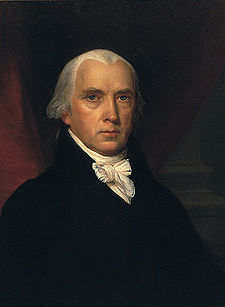
Federalist No. 14
Encyclopedia

James Madison
James Madison, Jr. was an American statesman and political theorist. He was the fourth President of the United States and is hailed as the “Father of the Constitution” for being the primary author of the United States Constitution and at first an opponent of, and then a key author of the United...
, the fourteenth of the Federalist Papers
Federalist Papers
The Federalist Papers are a series of 85 articles or essays promoting the ratification of the United States Constitution. Seventy-seven of the essays were published serially in The Independent Journal and The New York Packet between October 1787 and August 1788...
. It was published on November 30, 1787 under the pseudonym
Pseudonym
A pseudonym is a name that a person assumes for a particular purpose and that differs from his or her original orthonym...
Publius, the name under which all the Federalist Papers were published. It addresses a major objection of the Anti-Federalists to the proposed United States Constitution
United States Constitution
The Constitution of the United States is the supreme law of the United States of America. It is the framework for the organization of the United States government and for the relationship of the federal government with the states, citizens, and all people within the United States.The first three...
: that the sheer size of the United States would make it impossible to govern justly as a single country. Madison touched on this issue in Federalist No. 10
Federalist No. 10
Federalist No. 10 is an essay written by James Madison and the tenth of the Federalist Papers, a series arguing for the ratification of the United States Constitution. It was published on Friday, November 22, 1787, under the pseudonym Publius, the name under which all the Federalist Papers were...
and returns to it in this essay. No. 14 is titled, "Objections to the Proposed Constitution From Extent of Territory Answered."
Summary
While a democracy can cover only a small space, Republics may span over many provinces. This is because in a democracy, all people must gather into one place to vote. In a Republic the people elect representatives to vote. The greatest danger to a republic is to confuse it with ademocracy. It is easier to be united to have to travel to a distant province to represent the people than for that person to be isolated and attacked from all sides. So if Americans do not fall for a democracy, a republic will provide for a strong union, additional states, and security.

